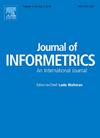Should we circumvent knowledge path dependency? The impact of conventional learning and collaboration diversity on knowledge creation
IF 3.5
2区 管理学
Q2 COMPUTER SCIENCE, INTERDISCIPLINARY APPLICATIONS
引用次数: 0
Abstract
The choice of research strategy is patterned by the essential tension between tradition and innovation. Drawing on the leadership continuum theory, this paper proposes a theoretical framework discussing the continuum of research strategy referred to as conventional learning. We explore how knowledge creation is affected by conventional learning and collaboration diversity. Relevant hypotheses are tested using data from the Web of Science (WoS) database between 1988 and 2018. The results indicate both focused and expansive conventional learning have a positive relationship with knowledge productivity, while they have a U-shaped effect on knowledge creativity. Collaboration diversity positively moderates the relationship between focused and expansive conventional learning and knowledge productivity. Furthermore, although low-level collaboration diversity is optimal for knowledge creativity when the level of conventional learning is low, high-level collaboration diversity is more beneficial for knowledge creativity when the level of conventional learning is high, both for focused and expansive. Our study provides important implications for creative individuals.
我们应该规避知识路径依赖吗?传统学习和协作多样性对知识创造的影响
传统与创新之间的基本矛盾决定了研究战略的选择。本文借鉴领导力连续体理论,提出了一个讨论研究战略连续体(即传统学习)的理论框架。我们探讨了知识创造如何受到传统学习与合作多样性的影响。我们利用 1988 年至 2018 年期间来自科学网(WoS)数据库的数据对相关假设进行了检验。结果表明,专注型和扩展型常规学习与知识生产率都有正相关关系,而它们对知识创造力的影响呈 U 型。合作多样性正向调节了集中式和扩展式常规学习与知识生产率之间的关系。此外,尽管当常规学习水平较低时,低水平的合作多样性对知识创造力是最佳的,但当常规学习水平较高时,高水平的合作多样性对知识创造力更有利,无论是集中式还是扩展式。我们的研究为具有创造力的个人提供了重要启示。
本文章由计算机程序翻译,如有差异,请以英文原文为准。
求助全文
约1分钟内获得全文
求助全文
来源期刊

Journal of Informetrics
Social Sciences-Library and Information Sciences
CiteScore
6.40
自引率
16.20%
发文量
95
期刊介绍:
Journal of Informetrics (JOI) publishes rigorous high-quality research on quantitative aspects of information science. The main focus of the journal is on topics in bibliometrics, scientometrics, webometrics, patentometrics, altmetrics and research evaluation. Contributions studying informetric problems using methods from other quantitative fields, such as mathematics, statistics, computer science, economics and econometrics, and network science, are especially encouraged. JOI publishes both theoretical and empirical work. In general, case studies, for instance a bibliometric analysis focusing on a specific research field or a specific country, are not considered suitable for publication in JOI, unless they contain innovative methodological elements.
 求助内容:
求助内容: 应助结果提醒方式:
应助结果提醒方式:


